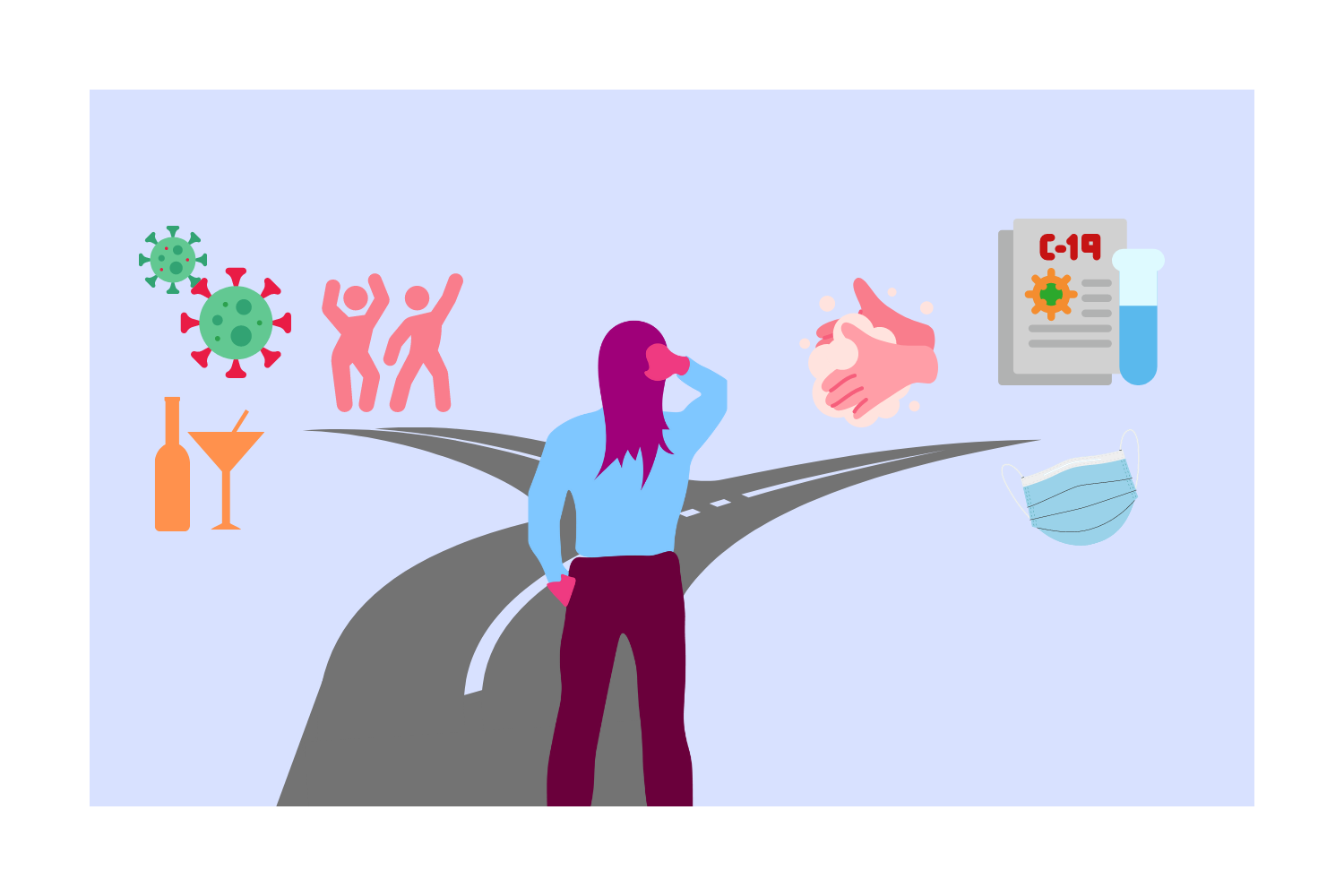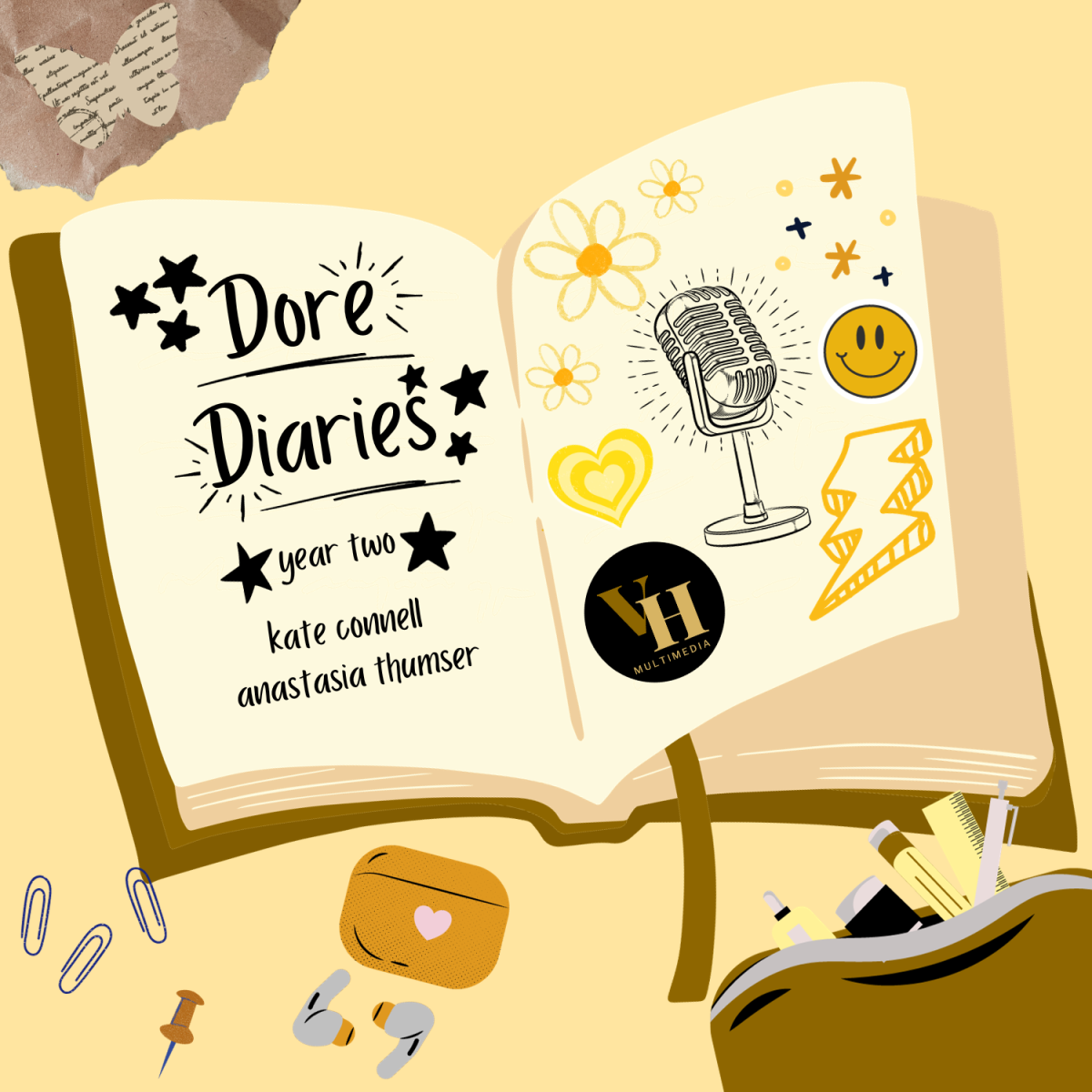Let’s set the scene. It’s been a long, challenging day. You’re exhausted from your school work and all you want to do is lay in bed and listen to music or watch a show. Just take a moment to recharge. But lo and behold, you hear the distant clamber of people in your hallway. Raucous laughter. The thought pops into your head: should I go out and see what’s going on? It’ll distract you from your relaxed evening plans. But you can’t miss out on the fun.
Right?
Friday rolls around and you’re about to settle in for a movie night with bags of snacks and a few close friends when you’re met with the scent of wafting perfume in the hallways and the sound of hairdryers in every bathroom. Everyone’s going out. Just the thought of being jostled against sweaty strangers in a humid room makes your stomach recoil, but an undeniable feeling of insecurity settles in your gut.
Am I having the true college experience?
What if my friends come back to tell me stories from their eventful Friday evening, and I wasn’t there to experience it?
What if they don’t invite me next time?
Ambiguous COVID-19 guidelines combined with intensified fear of missing out is making it difficult for students to make informed decisions about their health. From exam policy for quarantining students to where to get a COVID-19 test, there’s an overarching lack of transparency and communication from Vanderbilt’s administration. Should we get tested if we have the symptoms of a common cold? What about after being exposed? And if we stress ourselves into a stuffy nose and a sore throat? What then? If waiting for a test result, who do we need to alert? The line between easing our transition to college and protecting ourselves against COVID-19 is blurrier than ever.
Diving headfirst into the social scene
Vanessa: From the second move-in day started, I never got a break. Like most of us, I spent a year-and-a-half in isolation from almost everyone I knew. I found solace in the imaginary worlds of my favorite shows on Netflix after finishing my homework. I never felt the immense pressure to socialize because everyone was in the same boat. Now I can’t spend time alone in my room without a sinking feeling of guilt in my stomach. I’m constantly surrounded by people and with that comes that rushing obligation to go out and socialize. I’m worried that if I don’t do everything now, I’ll be left behind. Having back-to-back orientation activities for four days straight completely exhausted me. Within a week, I was already socially burnt out. Worst of it is, I blame myself for being burnt out. But why should I?
I’ve started to doubt myself. There’s always a persistent, nagging voice in my head questioning my decision to prioritize my own health and rest.
What if they’re having more fun without me?
What if I had gone out instead?
What if I went out but it wasn’t worth my time?
What if?
Just last week, I was torn between decisions. A group of my friends was going out for the night to explore the city. I was already tired from a day full of fun things and had only spent a little bit of time on my pressing responsibilities. I convinced myself that a little more fun wouldn’t hurt and that I would end up regretting not going. I quickly realized that I was pushing myself past the point of exhaustion and I wished desperately to go back to my dorm. Eventually, I was able to get back to my room, but it cost me my time, energy and happiness. Why had I chosen to go out just because I felt pressured to socialize? If only I had known where to draw the line.
I know these feelings are normal. At least that’s what Google tells me. But why doesn’t anyone talk about it? Why do people pretend to be fine when in reality they’re struggling?
Jyoti: I spent the past year-and-a-half writing stories about imaginary characters and enjoying the company of my few best friends. One of my biggest fears entering college was the social transition, knowing that introducing and proving myself to hundreds of new people would be absolutely terrifying. I decided to fake it till I made it. The dozens of conversations listing my name, major and Commons house while exchanging numbers gave the illusion of true connections. I had so many new friends! I was proud that I could rewrite myself as someone who was confident and collected, but inside I felt empty and burnt out. I was rethinking everything I said and cringing in retrospect.
On Tuesday night after four days of non-stop orientation, I found myself alone in my room for the first time after our last activity. I was hit with a wave of exhaustion, and simultaneously, fear. All I saw around me were people anxiously texting on their phones from one plan to the next, running around in groups together. Anxiety, homesickness, and competition rose in my chest.
There was surely something wrong with the fact that I was alone right now. At home, I thrived in my moments alone, craving them in fact. But here, I felt an inexplicable feeling of failure.
After calling my mom in a panic, that Tuesday night ended up being one of the evenings that set the tone for some of my best memories here so far. My lovely roommate and our lovely friend came home and we wrapped ourselves in blankets and talked about how crazy the experience of the past few days had been. We debriefed our whirlwind of emotions, how we were scared of feeling alone in a new place and wanted to surround ourselves with people who made us feel at home. It was through that conversation that I felt closer to the two of them than I had to any of the people I’d maniacally introduced myself to, pretending to be the glossy, fake-extroverted version of myself.
It was because we’d broken the facade of total happiness. We finally spoke the unsaid.
Radio silence on COVID-19
Jyoti: In the few weeks following move-in day, I pushed myself to join the rush of girls clustering into Ubers: primed for Friday and Saturday night adventures, fearful of the social repercussions of not joining in. And it all seemed to be going well. I felt sleep-deprived, guilty for not doing enough work and on the verge of tears at most times.
Or so I thought. It wasn’t until I texted a girl on my floor for homework advice that I began to rethink. She told me she had COVID-19 and was currently quarantining. She lived on my floor and sat behind me in class, and I wouldn’t have ever found out if it wasn’t for me randomly reaching out. I know it was my own ignorance, but part of me had just assumed we were all safe because we were all vaccinated. I’d been in crowded, stuffy dorm rooms and out exploring downtown Nashville, all while vaccinated people were getting COVID-19–what was I thinking?
I also know there’s no way I could blame myself. While the administration eventually provided us with a dashboard to track cases, there’s little to no discussion of the information except for those who actively seek it out, and I was not alerted of the fact that I’d had near exposures such as people on my floor and in my classes. There’s no way I can make informed decisions without the proper information.
Vanessa: Even though I live in a different house, I had a similar experience when it came to encountering COVID-19 in my immediate environment. I can’t truly explain how concerned I felt when I found out–about a month ago–that two people on my floor had positive tests for COVID-19. And I found out that information in such a casual way. My RA simply walked by me in the hallway and told me my floormates had tested positive in the same tone he might tell me what dinner was that night at Commons. This completely deviated from the nervous sense of urgency that had surrounded discussions around COVID-19 just a few months ago.
So many people were interacting with the others who tested positive for COVID-19 without knowing, simply because no one was talking about it. There was absolutely no transparency about the situation. I felt misled and even betrayed. What happened to the constant flow of information, the updates, the statistics? Even with the new COVID-19 dashboard, no one really has discussed how COVID-19 has looked on campus. All we can see is a percentage, which feels so distant. I wished that someone would tell me about cases in my near vicinity so I could take steps to protect myself. What was I supposed to do when Vanderbilt went radio silent on the virus? Is ignorance really bliss?
So what’s next?
The thing I know we can all do to help each other through this strange, convoluted time is just to start conversations with each other. Just because people are surrounded by heaps of friends (although that may just be how it appears from the outside), doesn’t mean they’re not lonely or struggling too. It’s okay to cut yourself some slack and realize that your mental health comes first. Having genuine, vulnerable conversations with people will help break the silence that has formed around socializing and transitioning to college. Don’t second guess yourself; you’re not the only one feeling this way.
Reach out to your friends, and check in with each other. Understanding and being honest with people—and yourself—about how you’re feeling can lead to wonderful strides in your blossoming friendships.
If there was a silver lining to the quarantine months of COVID-19: it gave us the chance to check in with our gut about the most meaningful relationships to us. While we should always trust our intuition in terms of what we feel, the pressures of our own insecurities and our peers can be confounding. Specifically now, given a burst of independence for the first time in many of our lives and on the exitus of a pandemic that stifled our social scene for so long, the opportunities feel endless: Do I go to their room or stay in mine? Hole up in the library or go out on the town?
Let’s be honest: sometimes all you need is to warm up your Munchie Mart mac n’ cheese, wrap yourself in a comforter and watch Sex Education.









